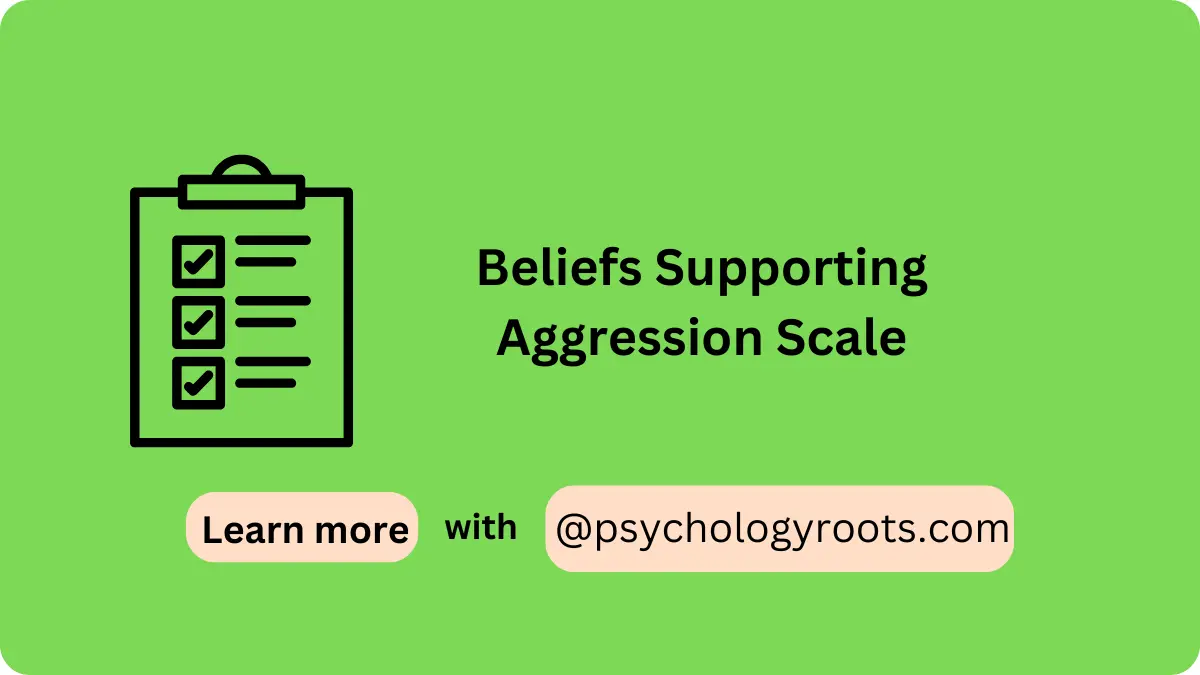Table of Contents
Beliefs Supporting Aggression Scale
Here in this post, we are sharing the “Beliefs Supporting Aggression Scale”. You can read psychometric and Author information. We have thousands of Scales and questionnaires in our collection (See Scales and Questionnaires). You can demand us any scale and questionnaires related to psychology through our community, and we will provide you with a short time. Keep visiting Psychology Roots.
About Beliefs Supporting Aggression Scale
Scale Name
Beliefs Supporting Aggression Scale
Author Details
Translation Availability
English

Background/Description
The Beliefs Supporting Aggression Scale (BSAS) is a self-report tool designed to measure normative beliefs that justify or support aggressive behavior, particularly among adolescents. Developed by Albert Bandura in 1973, the BSAS was created to explore how cognitive factors, such as internalized beliefs about the acceptability of aggression, influence violent behavior, aligning with Bandura’s social learning theory. The scale was specifically designed for African-American males aged 12-16 and administered in group settings using individual audio cassette players to ensure standardized delivery of items, with respondents seeing only response choices on written answer sheets. This innovative method aimed to reduce literacy barriers and enhance response accuracy in this demographic.
The BSAS consists of items assessing agreement with statements that normalize or justify aggression (e.g., beliefs that violence is acceptable to achieve goals or defend oneself). Respondents rate their agreement on a scale, typically Likert-style (e.g., 1 = “strongly disagree” to 5 = “strongly agree”), though exact item count and scoring details vary across studies citing Bandura (1973). Higher scores indicate stronger endorsement of aggression-supporting beliefs. The scale’s focus on normative beliefs makes it valuable for identifying cognitive risk factors for violence, particularly in at-risk youth populations. It has been strongly associated with violent behavior, as noted in subsequent research by Parke and Slaby (1983) and Slaby and Guerra (1988).
Psychologists and researchers use the BSAS to study the cognitive underpinnings of aggression, inform violence prevention programs, and evaluate interventions like cognitive-behavioral therapy (CBT) aimed at reshaping maladaptive beliefs. While designed for a specific demographic, its insights are relevant to broader aggression research. Limited to English and its original context, the BSAS remains a specialized tool primarily for research rather than clinical practice.
Administration, Scoring and Interpretation
- Obtain a copy of the Beliefs Supporting Aggression Scale from primary sources citing Bandura (1973), such as peer-reviewed journals or authorized research archives, ensuring ethical use permissions.
- Explain the purpose to respondents, noting that it assesses beliefs about aggression to understand behavior, emphasizing confidentiality and the group setting’s structure.
- Provide instructions, ensuring each respondent has an audio cassette player with headphones to hear standardized item prompts and a written answer sheet with response choices (e.g., 1-5 Likert scale). Respondents mark their agreement with each statement based on the audio.
- Approximate time for completion is about 10-15 minutes, depending on the number of items and respondents’ pace.
- Administer in a controlled group setting, such as a classroom or research lab, with adequate spacing and equipment to ensure privacy and focus.
Reliability and Validity
The Beliefs Supporting Aggression Scale has documented psychometric properties, though limited by its specialized application. Internal consistency is moderate, with a Cronbach’s alpha of 0.66, indicating acceptable but not robust item cohesion, likely due to the diverse aspects of aggression beliefs assessed. Test-retest reliability is not widely reported, but the scale’s stability is inferred from its consistent association with behavioral outcomes across studies.
Convergent validity is strong, as evidenced by its robust association with violent behavior (r ≈ 0.50-0.70), as cited by Parke and Slaby (1983) and Slaby and Guerra (1988), and correlations with related constructs like hostile attribution bias in aggression research. Discriminant validity is supported by its focus on normative beliefs about aggression, distinguishing it from general personality traits or unrelated attitudes (r < 0.30). Criterion validity is demonstrated by its ability to predict violent behavior in African-American male adolescents, particularly in high-risk settings, and its utility in identifying candidates for violence prevention programs. These qualities affirm the BSAS’s value in targeted aggression research, though its psychometric rigor is modest compared to modern scales.
Available Versions
06-Items
Reference
Bandura, A. (1973). Aggression: A social learning analysis.
Important Link
Scale File:
Frequently Asked Questions
What does the BSAS measure?
It measures normative beliefs supporting aggressive behavior.
Who can use the BSAS?
Researchers and psychologists studying aggression in adolescents.
How long does the BSAS take to complete?
It takes about 10-15 minutes.
Is the BSAS specific to African-American males?
Yes, it was designed for this group, aged 12-16.
Can the BSAS inform violence prevention?
Yes, it identifies beliefs linked to violent behavior for targeted interventions.
Disclaimer
Please note that Psychology Roots does not have the right to grant permission for the use of any psychological scales or assessments listed on its website. To use any scale or assessment, you must obtain permission directly from the author or translator of the tool. Psychology Roots provides information about various tools and their administration procedures, but it is your responsibility to obtain proper permissions before using any scale or assessment. If you need further information about an author’s contact details, please submit a query to the Psychology Roots team.
Help Us Improve This Article
Have you discovered an inaccuracy? We put out great effort to give accurate and scientifically trustworthy information to our readers. Please notify us if you discover any typographical or grammatical errors.
Make a comment. We acknowledge and appreciate your efforts.
Share With Us
If you have any scale or any material related to psychology kindly share it with us at psychologyroots@gmail.com. We help others on behalf of you.